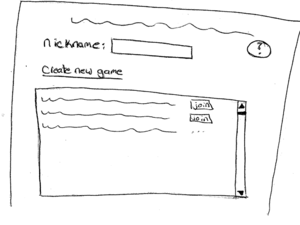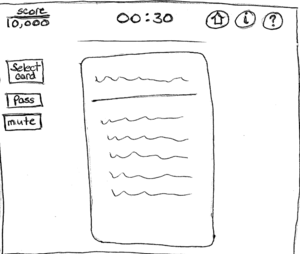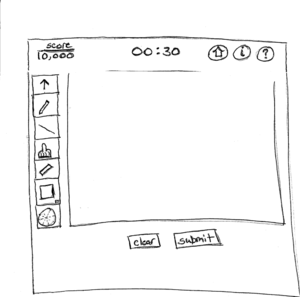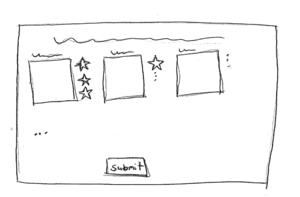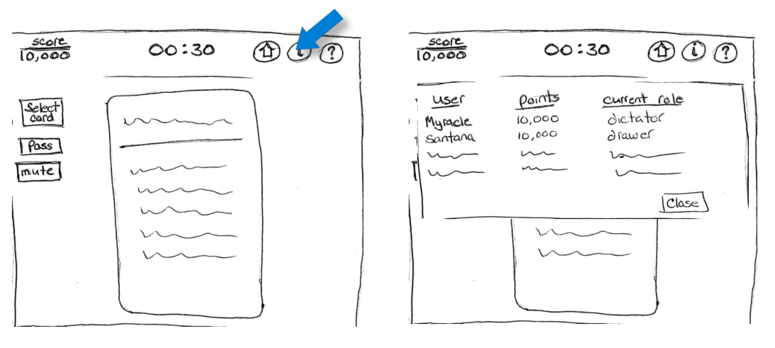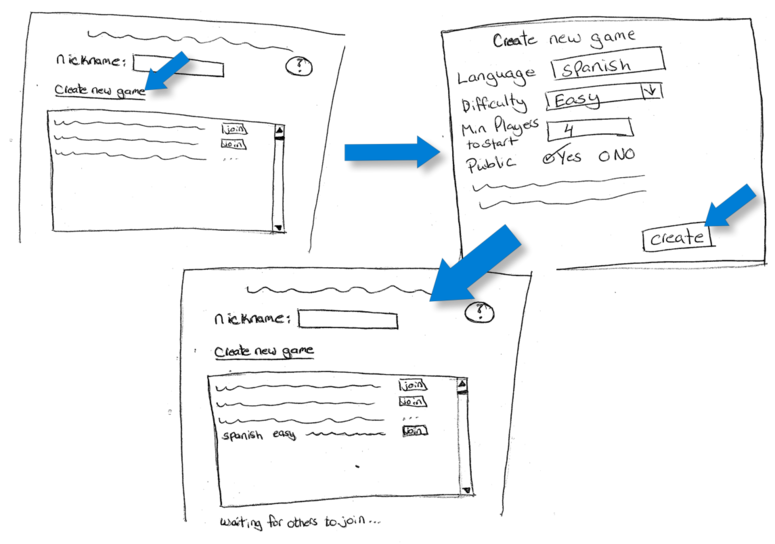Group Contextual-Inquiry:Group Phi-tus
From CS 160 Fall 2008
Contents |
Team Members
Kevin Friedheim Interviewed "Vera" as well as worked on task analysis questions. Also made additions to various parts of the report.
Frank Yang Interviewed "David" as well as worked on task analysis questions. Also did the Analysis of Approach.
Xuexin Sean Zhang Did the Problem and Solution Overview, as well as helped Juan with User Interface Description and Sample Tasks. Did Sketches.
Haosi (Jason) Chen Interviewed "Joyce" as well as worked on task analysis questions.
Juan Padilla Did the Functionality in User Interface Design and helped Sean with User Interface Description and Sample Tasks. Did Sketches.
Problem and solution overview
- A quick note: Our group decided to change our serious game in an attempt to bring about more of a "fun factor" in the learning process.
This game requires even number of players and could be played for even number of rounds. The game could be divided into six phases as the following: 1. Pairing up Phase Each player will rotating between the roles of dictator and drawer in each round of game, and will be assigned to another player of different role as team partner for the round randomly. 2. Dictation/Drawing Phase After the pairing up phase, all the dictators of each team will be revealed the same picture of a object. Within a limited amount of time, the dictator will need to describe the object in that picture to the drawer in the same team without using the name of the object while the drawer draw out a picture of the object that he or she believed to be what the dictator described. 3. Voting/Ranking Phase Once the time is up, the program will randomly and anonymously ordered the pictures drawers drawn and asking all the dictators to rank among them. 4. Rewarding/Review Phase Once the ranking is done, the team of both dictator and drawer will be rewarded according to the rank of the picture the drawer drawn. And the result will be review by every player in the game. Unless the number of round is reached, it will go back to the first phase to pair up new teams.
5. End of Game Phase After the number of round is reached, the game will display the ranking of players and the game finishes here. At this point the players are given an opportunity to discuss how the game went and offer advice on things like pronunciation, vocabulary, and even game strategy.
Contextual inquiry interview descriptions and results & Description of users
As mentioned below, we decided to perform majority of the contextual interview by interviewing as opposed to observing. We did this for reasons listed in our analysis of approach. Prior to interviewing, our group had decided on a basic set of questions that we felt needed to be answered by our interviewees. However, we did not limit ourselves to theses sets of questions since each interviewee differs from the next in both situation and in context. The questions that we asked, and their responses immediately follow this report.
David 20 yrs old - MCB, Junior
David is currently a junior at UC Berkeley, majoring in Molecular Cell Biology. Born in the Southern California, he grew up speaking English and Mandarin. Both of his parents were born in Taiwan, so at home he mainly speaks Mandarin, but speaks flawless English everywhere else. The interview was conducted at the Free Speech Movement Cafe on the UC Berkeley campus, a place where David enjoys studying. As soon as he sat down, he put in the earbuds to his iPod and opened up his reader for the Taiwanese DeCal. At first he just reviewed the words intently, muttering to himself to establish the link between the vocabulary word and its translation. After a couple minutes, he pulled out a piece of paper and covered half of the page on the reader, covering up the vocabulary word and only leaving the English translation visible. Every once in awhile, he would close his eyes and have a puzzled look as he tried to recall the word without looking at it. Eventually, he pulled out a blank sheet of paper and thrust the reader toward me and asked me to quiz him. The page just had a list of vocabulary words in the left column and a list of the English translations on the right column. He told me to just read out the English translations to him in a random order and he would write it down and say it out loud. This whole chain of events from beginning to end lasted about 20 mintues. After this, I asked David the basic questions we had prepared.
Vera, 23 years old - Integrative Biology, Senior
Vera is a 23 year old Integrative Biology senior at U.C. Berkeley. She is planning to visit Nepal next summer to gain some experience in the medical field. Prior to leaving for Nepal she is taking a Nepali course so the communication barrier would not pose as great a deterrent from gaining the experience that she hopes to gain. This, however, is not the only reason for learning Nepali; she is learning the language to fulfill a U.C. language requirement as well. The language course that she is taking is introductory, so the bulk of her studies is learning grammar, spelling, and punctuation. She explained to me that, although these things are useful on paper, it wasn't until she got together with her Nepali friend that the real learning began. She plans on going to Nepal with this friend who knows the language already, and as a means of practicing the language for understanding and fluency, they would force each other to talk only in Nepali. She describes that, although her vocabulary base was very limited, gradually she picked up words here and there (in conversations with her friend), and now she was able to speak and comprehend the language more fluently. Our meeting place was at Memorial Glade, over lunch. I had previously explained to her our group's project idea and also that it was not my intention to interfere with her studying. This is why I decided that to ask only if I might witness a mock conversation with her friend so that I can see what strategies she used to learn. We met with her friend, and immediately they began to commence the conversation. Two things popped out at me as I watched: first, Vera would refer back to a review sheet that she was holding whenever she had trouble, and second was that her friend would help her whenever Vera got stuck. When the conversation ended, I thanked them both for their performance, proceeded to ask the basic questions.
Joyce 19 years old - Social Welfare, Junior.
Joyce is a 19 years old junior at U.C. Berkeley. She told me that she went to Italy with her high school friends couple years ago for vacation. The Italian culture and their language really impressed her, and she thinks Italian is fascinating. Therefore, she decided to study more about Italian once she got back from Italy.She told me that taking Italian course in school and learning Italian during her trip at Italy are really different. In school, they will concentrate on learning grammar, vocab, and a little bit of pronunciation. She has improved a lot in written Italian. She said that the things that she learn in class is hard to apply and use in real life. Although the course help her to improve the written skill, she thought the real learning happened when she was in Italy. She told me that because the environment force them to keep speaking in Italian through out the whole trip, she was able to learn the words here and there, and have a good amount of time for them to practice. Therefore, her Italian spoken skill had a huge improvement after the trip. She explained to me that, she feel like it is hard to improve her Italian by just taking courses, because she would never get enough time and it hard to find someone that can speak Italian to her in order for her to practice the speaking.
List of tasks:
Easy:
1. preparing flashcards for the purpose of studying for a quiz
2. practicing vocab words for a vocab quiz
Moderate:
1. practicing vocabulary words in structured sentences for an oral exam.
2. refining pronunciation
Difficult:
1. Practicing and preparing for skits/plays.
2. Socializing as a means of practicing the language.
Task analysis questions
1. Who is going to use system? We are attempting to design our game such that anyone that enjoys games and is trying to learn/improve a particular language can play.
2. What tasks do they now perform? Outside of the common tasks that occur in class (i.e. learning/coping grammar and performing written and verbal exercises) is the use of flashcards. Creating the flashcards involves having the words/phrases transferred onto index cards. Memorization by use of flashcards involves repetitively filtering through the cards one at a time, until each card can be correctly recited and/or remembered. Recollection is the task most commonly drawn upon when performing such activities as rehearsing for a skit or conversing with someone in an attempt to develop language fluency.
3. What tasks are desired? When I asked Vera what she could use to better her language learning, she told me, half jokingly, a partner with whom she could practice. I think we can all agree that studying solidarity versus with a partner makes a world of difference in the learning process. Part of learning is, after all, teaching.
4. How are the tasks learned? Initially, language is taught from a book or from an instructor that can ease the process of learning onto a student. Next comes the practice and of course, the memorization. When asked, Vera, Joyce, and David said that vocal activities are what really cause someone to learn a language in all of its intricacies.
5. Where are the tasks performed? All tasks can be performed anywhere anytime when someone want to study for a new language.
6. What’s the relationship between user & data? The data is the language that the student wants to learn. Therefore the user has a very intimate relationship with the data since he must be very fluent in using the language.
7. What other tools does the user have? In addition to any computer device that will run our game, player can just turn this game into a board game with only paper and pens.
8. How do users communicate with each other? User can communicate with each other through the text box in the interface, use it as a online chat room.
In our proposed solution, the users will also have the opportunity to speak through a microphone to instruct other players in order to develop their oral skills. Since the players will have to listen to the speaker and draw a corresponding picture, the players will also utilize and hone their listening abilities. After this phase, the judging phase allows for the dictators to view the interpretations of what they just described. By the end of the results phase, both the speaker and listener will know how they did as a speaker or listener based on the distributed points. It would be simple to implement a discussion phase after each round to provide instant feedback between the speaker and listener.
9. How often are the tasks performed? In the classroom setting, there are vocabulary quizzes at least once a week. However, in order to prepare for written and oral exams , the tasks involving learning new vocabulary words and practicing sentence structure may be performed a 3 to 4 times a week. Most language courses meet 3 times a week and since each class is rather involved with student interaction, slight preparation is needed before each class.
10. What are the time constraints on the tasks? Because these are tasks relating to a course, the only time constraint is the time before the next class, quiz, or exam. None of these tasks involve truly time-sensitive materials where they must be finished within an hour. However, from the proposed game's perspective, the player should have an improved sense of verbal communication as well as a stronger grasp of the vocabulary set involved with the game.
11. What happens when things go wrong? When any of the tasks are not achieved, if the person is taking a class, his or her grades will suffer. However, from an emotional viewpoint, when the person is trying to learn a language and seems to make no progress, the person will be less and less motivated to put forth the effort to learn unless there is another external motivation, such as an academic grade. If the person tries to learn a language with his or her own will and fails to do so after considerable effort, the person will most likely give up. Hopefully with a fun program such as our proposed game, players will be able to develop listening and speaking skills while avoiding the stressful classroom environment.
Interface design
Functionality summary
Our interface design is geared to provide a simple and natural way for the user to learn a new language while having fun. As such, our interface will provide the users all the tools necessary to easily sketch their thoughts, provide the dictators with keywords and forbidden words, easily allow communications with other players, view the game’s current players including their scores and role, view the player's own score and the time remaining to play in the round. Moreover, at the end of each round the interface will provide the dictators with a viewable area so that all of the dictators can easily rank the drawings for game scoring.
User interface description and sketches
The initial "login" screen will contain information about games currently being played including the number of players, language of the game, the ability to join the game already in progress, etc. and a button for game rules. Furthermore, this screen will provide a text box to allow the user to enter in their screen name a button to start a new game and wait for other players to join.
All game play screens, regardless of role, will have a vertical dashboard located at the top of the screen. This dashboard gives the user a quick visual of the time remaining in the game, the number of points they currently have, access to their opponent’s information, such as current role, i.e. drawer or dictator, and point totals, and a consistent and easy way to access the help and home buttons.
During game play, depending on the player’s current role, they will see one of two interfaces:
The dictator’s interface during game play is fairly simple. In addition to the dashboard described above, it will consist of a simple screen showing the keyword in the form of an image or text and a set of illegal words underneath it. Additionally, there will be buttons to allow the user to select a new keyword and pass if they think the object to describe will be too difficult.
Dictator Interface
The drawer's interface is much more complex as it needs to provide the user with drawing tools to create their masterpiece. In order to keep things familiar and simple, the interface will be similar to most "paint" programs in that it will have a vertical tool bar containing the basic tools necessary such as a paint brush, pen tool, eraser and color selector on the left of the screen and a drawing pad in the remainder of the screen on the right. Additionally, a set of two buttons underneath the drawing pad will allow the user to clear the entire drawing in order to start over or submit the drawing before the time has expired completely.
Drawer Interface
The tally screen gives the dictators the chance to rate the images. Therefore, the dictators are all presented with a screen containing all the images drawn for that round. Each image will have a set of stars on the right of it. Initially the stars will be colorless but as the dictator sets their input device over the stars, a portion of it will be colored in allowing the dictator to choose a fraction of the star. Once the correct portion of the star is colored the dictator can to simply click or tap on the star and that portion will stay colored. This scheme is similar to many programs that allow rating and should be simple and familiar to the users. Once the dictator has rated all of the drawings, he or she can submit their choices with the submit button on the bottom.
Three (3) scenarios of example tasks with sketches
Draw a picture and submit During game play the user needs to draw pictures to try and guess the word being described by the dictator. To do this, the user must choose a tool from the toolbar on the left. Once, the proper tool is selected the user can begin drawing the picture by moving the tool over the drawing canvas on the right. If desired, the user may select additional tools as necessary, repeating the same process. Once the user has completed their drawing, if the time has not elapsed, the user may submit the picture for ranking by clicking the submit button at the bottom of the screen.
View other opponents The user wants to see where their current point standing is in relation to their opponents or see what role a certain opponent is in the current game. The user simply selects the (i), info, button at the top right in the top vertical dashboard. This will bring up a screen showing all of the user's current opponents stats for the current game.
Create a new game
In order to create the new game, a user will begin at the login/home screen. First the user selects the create new game link above the current games. Next, the user will be presented with a screen allowing them to fill in options about the game such as, language type, difficulty level, if the game is public or private, etc. Once the user is finished selecting the options, they can then press the create button, at which time they will be redirected back to the login screen where the new game will be in the list of current games to join and a message indicating that they have created a new game and now need to wait for others to join.
Analysis of Approach
The serious game approach allows for a commonplace task, that might otherwise be boring or tedious, to be interesting. In regards to the task of studying, the serious game provides a way for interested people to be more willing to practice the foreign language they want to learn. There aren't very many checkpoints between the time the person begins learning and the time that they actually use the language in the real world to gauge the progress. Classroom settings guide the goal of the class to achieving the highest grade, which does not necessarily mean having the best grasp of the language. A serious game would be a way for a person to self-assess his or her own abilities without the pressure of not getting the 'A' in the course. This is not to say that the application would be considered separate from anything taught in class. The application would provide a less tedious way of learning, and provide easy access to another person with the same goals. By offering an application such as this, students are not limited to just their classmates to practice with, but to anyone in the world that is learning the same language.
Our approach is not perfect, however. Because our approach involves working the user's oral and listening skills, the typical repetitive review of vocabulary words to commit them to memory is not addressed. While in the long run, the use of the application will surely help in learning a language, the application cannot replace the cramming that is sometimes required for a vocabulary quiz. The application calls upon the user's ability to recall and recognize key words that are used to describe an object, but it does not in fact teach the words to the players. Our application assumes that the players are already somewhat familiar with words they must know.
While there are many alternatives to practicing a language, our approach provides a method for users to communicate with other language learners from all over the world. Outside of the classroom, there are very few opportunities for a student to practice what was just learned in a different environment. Our application provides a very accessible way to instantly connect to people wanting to practice the language as well. The current available language building programs such as Rosetta Stone focus mainly on teaching the user the language from the ground up. This usually involves a prerecorded voice speaking to the user and having the user respond by selecting the correct image. While this may be effective in teaching, there is no "fun value" to it. To address the issue of pronunciation, some programs attempt to analyze voice as input via machine, but these methods are not accurate at all. The most surefire way of seeing whether pronunciation is correct is to have instant feedback from another human source, which our application would easily provide. Since our application potentially involves connecting users over the internet, we essentially create a whole community of people with the same goals and objectives, something that any standalone program today does not provide.
Since our target user was any person trying to learn a new language, any "Master/Apprentice" approach would involve watching a student study for a quiz or exam. Since this would seriously impede the interviewee's ability to study, we only briefly observed and asked many questions about their study methods. For the same reasons, we limited the number of interviewers to one for each interviewee.
- Questions for interview:
What language are you currently learning? Italian, Nepali, Chinese
Why do you want to learn a new language?
What exercises does your instructor require you do in class that you find to be most beneficial?
Are you fluent in any other languages?
What tools do you currently use to help you study? Any issues with those tools?
What do you usually do to study for a vocab quiz? A written exam? An oral exam?
Do you study with others?
How much do you value speaking as a means of learning?
If you had chance to regularly practice speaking with someone, would use it?
Do you use any memorization methods to remember vocabulary words?
Do you feel that using vocabulary words in constructed sentences would help you memorize the word?
Whats the pros and cons for the learning method you are using?
Questions for interview:
Vera, 23 years old - Integrative Biology, senior
What language are you currently learning? Nepali Why do you want to learn a new language? Becuase I am going to be voluterring in napal. Just to be more accomplished (and to furfill a language requirement). Thought Nepali was an interesting language to learn. What exercises does your instructor require you do in class that you find to be most beneficial? Outside of class we memorize ... used flashcards. Mostly the instructor introduces rules of writing/grammer. Are you fluent in any other languages? no What tools do you currently use to help you study? Any issues with those tools? flash cards - didn't help with pronounciation What do you usually do to study for a vocab quiz? flashcards Do you study with others? yes. we would always talk to eachotehr and carry out real conversations all in nepali. How much do you value speaking as a means of learning? crucial!! If you had chance to regularly practice speaking with someone, would use it? yes, all the time. Do you use any memorization methods to remember vocabulary words? flashcards. Do you feel that using vocabulary words in constructed sentences would help you memorize the word? no. becuase you have to know what other words in sentences are. Whats the pros and cons for the learning method you are using? doesn't allow for pronounciation. Was there any particular genre of words that you learned? Yes, medical terms and parts of the body will be very important for interaction with patients.
Questions for interview:
Joyce 19 years old - Social Welfare, Junior. Had gone to Italy and took Italian courses in Berkeley for 1 year.
What language are you currently learning?
Italian
Why do you want to learn a new language?
I think Italian is really fascinating after I went travel to Italy with my friends in high school, and I want to learn more stuff that related to their culture.
What exercises does your instructor require you do in class that you find to be most beneficial?
Each person in class will assign a partner. We will both have a picture in hand, and the other one will need to describe the picture in Italian. I thought that method was really helpful.
Are you fluent in any other languages?
Yes, I am also fluent in Chinese.
What tools do you currently use to help you study? Any issues with those tools?
Online dictionary. Sometimes word for word translation is not accurate and useless.
What do you usually do to study for a vocab quiz?
flashcard
Do you study with others?
yes. we will meet up and study before exams. Sometimes we will make up short conversations for practicing.
How much do you value speaking as a means of learning?
A lot.
If you had chance to regularly practice speaking with someone, would use it?
yes, I will use it as often as possible.
Do you use any memorization methods to remember vocabulary words?
flashcards.
Do you feel that using vocabulary words in constructed sentences would help you memorize the word?
Sure.
Whats the pros and cons for the learning method you are using?
The flashcards method is not enough interaction, I can only practice by myself.
David 20 yrs old - MCB, Junior
What language are you currently learning? Taiwanese Why do you want to learn a new language? I wanted to learn Taiwanese because growing up, my parents spoke both Mandarin and Taiwanese, but I could only understand Mandarin. My grandparents all speak Taiwanese, but when they talk to me, I can only pick out a few words and can never understand them completely unless they speak Mandarin. Since Taiwanese is just a dialect, it is rarely courses that teach it. Since there was a DeCal teaching Taiwanese, I wanted to take advantage of the fact and attempt to improve my Taiwanese skills. What exercises does your instructor require you do in class that you find to be most beneficial? I usually found any exercise that forced us to speak and construct sentences extremely helpful. After all, the best way to improve language skills is through constant practice. Specifically, there were some exercises where we were paired up and we had to reenact certain scenarios using certain vocabulary words. Also, I found it extremely useful when the instructor spoke only in the language that he or she was teaching. It's very intimidating, but it forces you to really listen and pay attention. Actually, it's really stressful, but I still feel like it helps. Are you fluent in other languages? Yes, Mandarin. What tools do you currently use to help you study? Any issues with those tools? Just the materials that were given to us in class. Since Taiwanese is just a dialect of Chinese, there is no proper way to write it, so we had to follow the methods that were provided by the DeCal instructors. When there were vocab quizzes, I didn't bother making flashcards because not only was the class just a DeCal, I knew I could rely on my short term memory to pass the quiz. Making flashcards seemed like too much of a hassle to try and make. I did sometimes just cover up the vocab words and try to recall them from memory based off the translations. Do you feel that using vocabulary words in constructed sentences would help you memorize the word? Definitely. Whats the pros and cons for the learning method you are using? With just flashcards, there is no way to get any feedback on the way I am pronuncing the word. Even if I tried to construct a sentence with the word, I can't tell if I am using the word correctly or with the proper grammar. Without instant feedback, it's very hard to correct mistakes. It'd be great if there was some sort of resource that could instantly tell you exactly what sort of grammar or pronunciation mistakes you are making. What sort of things would you look for in a "serious game" geared toward learning a language? If there was some sort of tool where I could practice my speaking ability and review vocabulary words at the same time and still have some fun doing it, that'd be amazing. But honestly, it would help so much if there was just some way I could see just how coherent I can be when I'm forming sentences in another language.
